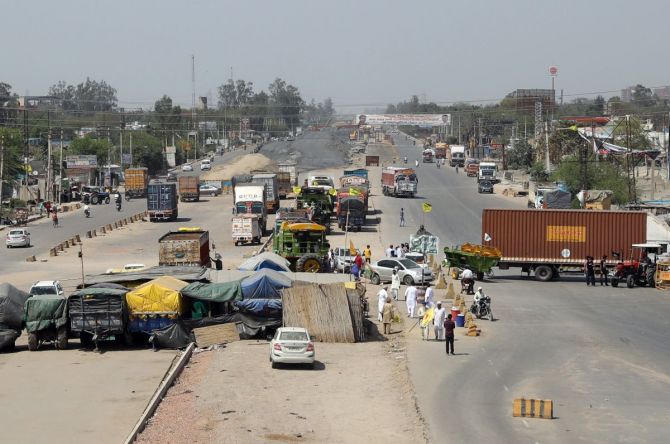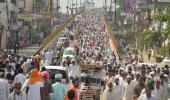A man was lynched, his hand chopped off and the body bearing over 10 wounds caused by sharp-edged weapons tied to a barricade at a farmers' protest site at Kundli near the Delhi-Haryana border, a gruesome incident being blamed on a group of Nihangs.

Hours after the macabre crime, a man wearing the blue robes of the Sikhs' Nihang order appeared before the media, claiming that he had 'punished' the victim for 'desecrating' a holy book.
Other Nihangs claimed he had 'surrendered' to police, who were yet to confirm this till late in the evening.
They were, however, questioning some suspects.
Earlier, in a video clip that surfaced on social media, some Nihangs are seen standing around the injured man with his severed left hand close to his head.
The group is heard accusing him of desecrating a Sikh holy book.
The video shows the Nihang group asking the badly injured man, who is pleading with them in Punjabi, where he had come from and who sent him.
One of the Nihangs says the man is a 'Punjabi' and not an outsider, and it should not be made into a Hindu-Sikh issue. Another raises a religious chant.
The Samyukta Kisan Morcha (SKM), an umbrella body of farmer unions, said a group of Nihangs has claimed responsibility for the killing after the man allegedly tried to desecrate the Sarbloh Granth.
Haryana Chief Minister Manohar Lal Khattar held a meeting with Home Minister Anil Vij and senior police officers, directing strict action against those found guilty.
The victim, Lakhbir Singh, was a labourer from Cheema Khurd village in Punjab's Tarn Taran and aged around 35 years, police said.
His body was found tied to an overturned police barricade near a dais put up by the farmers protesting there for several months now over the Centre agri-marketing laws.
"The Kundli police station received information at 5 am that a body was found near the farmers' protest site," a Sonipat police official said.
A Haryana Police spokesperson said in Chandigarh that when Sonipat police reached the spot the man had died.
"Some people were standing there. When police tried to take the body away, they protested. After some efforts, the body was brought to the civil hospital," the spokesperson said.
Singh was found wearing only a pair of shorts. His hand was cut off at the wrist and a foot bore deep injuries. Altogether, there were over 10 injury marks inflicted by sharp-edged weapons.
He was allegedly dragged by his assailants for a few metres before he was strung with ropes to the barricade. He is said to have bled to death.
"We have registered a case and further investigations are on," Additional Director General of Police, Rohtak Range, Sandeep Khirwar told PTI over the phone. Khirwar, who later visited Kundli, told reporters that police hoped to make arrests very soon.
"We have the names of some suspects and the investigations are on. I am hopeful that we should be able to make headway very soon, as we have some leads in the case," he said.
Back in his Tarn Taran village, Singh's family was in shock and said he could never desecrate a holy book.
Some villagers told reporters that his parents died a few years ago and his wife and three children stayed with some relatives.
He was said to be staying with his sister.
The Sonipat police said some people initially resisted their entry into the area where the body was tied to the barricade, and were not cooperating with them.
The Nihangs are a Sikh order, distinguished by their blue robes and often seen carrying spears and swords.
Last year, a Punjab policeman's hand was chopped off with a sword and his six colleagues injured in an attack allegedly by a group of Nihangs at a village market in Patiala when the accused were asked to produce curfew passes.
The policeman's hand was later reattached after a surgery at the PGIMER in Chandigarh.
A case of murder was registered at the Kundli police station in Sonipat against unidentified people, police said. A board of doctors conducted the post-mortem at the Sonipat civil hospital.
At least five video clips connected with the murder have surfaced on social media.
In a statement, the SKM said it wanted to make it clear that 'both the parties to the incident', the Nihang group and the victim, have no relation with the Morcha.
The peaceful and democratic movement of the farmers is opposed to violence in any form, it added.
The SKM said it is against the desecration of any religious text or symbol, but that does not give anyone the right to take the law into their own hands.
It demanded that the culprits be punished in accordance with the law after investigating the allegation of murder and the 'conspiracy' behind the 'sacrilege'.
'As always, the Samyukta Kisan Morcha will cooperate with the police and the administration in any lawful action,' it added.
Farmer leader Abhimanyu Kohar told PTI that the Nihangs were not part of the SKM's protests and claimed that the victim had been staying with the same group for some time.
In a video message, Yogendra Yadav, condemned the incident and said several SKM leaders had asked the Nihangs to leave the site, but they stayed put.
Thousands of farmers, mostly from Punjab, Haryana and western Uttar Pradesh, have been camping at three border points of Delhi for months, demanding a repeal of the three farm laws enacted by the Centre in September last year.











 © 2025
© 2025